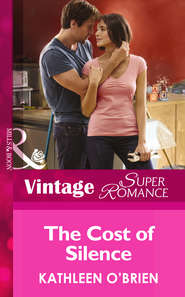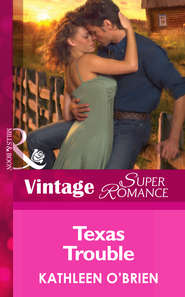По всем вопросам обращайтесь на: info@litportal.ru
(©) 2003-2025.
✖
Winter Baby
Автор
Год написания книги
2018
Настройки чтения
Размер шрифта
Высота строк
Поля
“What’s not working? What exactly isn’t working?”
He made an impatient noise, as if he felt she were being deliberately dense. “We’re not working. You’ve changed lately, you know that. You’ve been—well, to put it bluntly, Sarah, you’ve been bitchy for months. You criticize everything I do, for God’s sake, at school and at home. And it’s been weeks since you’ve wanted to make love, really wanted to. I know some of it is my fault. I’ve been busy. Preoccupied. Maybe I haven’t been as thoughtful as I should. I know I forgot your birthday.”
She closed her eyes on a small swell of nausea. He hadn’t forgotten her birthday. His florist had. For every major holiday, anniversary or birthday, his florist had a standing order to send her white roses. Ed had never even asked her whether she liked white roses. Which she didn’t.
She hated white roses, especially hothouse ones, which never quite opened and had no real scent. Why hadn’t that told her something, right from the start?
“Anyhow, it’s obviously not going to work. I’m sorry, Sarah. But this seems like the perfect time to make a clean break. Don’t you think so? With me leaving. Next month. Maybe sooner.”
She felt herself trembling with shock. And beneath the shock, but rising…something that felt like anger.
“No, actually, I don’t think so. Remember I said I had news, too? Well, here it is. I’m pregnant, Ed. I’m going to have a baby. Next July.” She smiled tightly. “Maybe sooner.”
For a moment, he reacted as if she had produced a gun and aimed it at his heart. He blinked. His mouth dropped open. He felt blindly with both hands for the metal railing behind him.
But he recovered quickly. He straightened to his manly six-four, a full foot taller than her own height, as if he could intimidate her into withdrawing her accusation by sheer size. He narrowed his eyes, closed his jaw and squeezed the railing so tightly his knuckles grew white.
“That’s ridiculous,” he said through clenched teeth. “It’s simply not possible. I have never had unprotected sex with anyone in my entire life. Never.”
She lifted her chin. “And I have never had sex with anyone but you,” she said. “So obviously we’re part of that small but unlucky percentage for whom the protection wasn’t quite infallible.”
He was shaking his head. “Impossible,” he said firmly. “Simply impossible.” After a moment, his face changed, and he moved toward her, his eyes liquid with a false pity. “Sarah. If this is some pitiful attempt to hold on, to try to keep me from going to California—”
When he got close enough, she slapped him. The sound rang out in a momentary lull in the partying below. Several Santa hats looked up toward her balcony curiously.
Ed rubbed his cheek, which was probably stinging. It was definitely red. “Good God, it’s true.” He looked bewildered. “It’s really true?”
“Yes, you bastard,” she whispered furiously. “Of course it’s true.”
He worried his lower lip, his unfocused gaze darting back and forth unseeingly, as if he were scanning his mind for options. “Well, no need to panic,” he said softly. She knew he was talking more to himself than to her. “It will be all right. There are lots of ways to fix this. It’s not even very expensive anymore.”
For a moment she thought she was going to be sick. Morning sickness already? At night? But then she realized it was pure, unadulterated disgust. Fix this? As if she were a bad bit of plumbing.
“Get out.” She pulled the sliding glass door open behind her with a savage rumble. “Get out of my house, and don’t ever come back.”
“Sarah, calm down.” He reached out to touch her shoulder, but she jerked away. “This isn’t the end of the world. Let me help you. At least let me write you a check—”
“Get out.”
He moved through the door, but at the threshold he paused again. He was trying to look concerned, but under that fake expression she glimpsed the truth. He was relieved that she was throwing him out. Relieved that he could scuttle away from the problem and still blame her for being unreasonable.
“I want to help you deal with this,” he said. “I’ll pay for whatever it costs. But remember, I won’t be here for long. I’m heading out to California next month, maybe—”
“I know,” she said. “Maybe sooner. As far as I’m concerned, it’s not soon enough. Or far enough. Now get out.”
A WEEK LATER, the gynecologist confirmed what the little pink x’s had told her so clearly that night. Sarah was going to have a baby next summer. Probably late June or early July. Congratulations.
But it still seemed unreal. Like a very, very long bad dream. As she entered her apartment, Sarah dropped her purse, her mail and her So You’re Having a Baby brochure on the coffee table. Then she dropped herself onto the sofa, like a puppet with cut strings.
Her answering machine was blinking. One call. It was probably Ed, who had left one message every day this week. Each time he said the same thing. “I’ve looked into it, and your insurance will cover the procedure. I’ll write you a check for any out-of-pocket expenses. But you need to hurry, Sarah. The sooner the better, as I’m sure you know.”
She pulled her feet up underneath her and rested her head on the softly upholstered arm, hugging her “Peace on Earth” pillow to her chest. Maybe she ought to call him back. Surely two people who were close enough to create a baby ought to be able to discuss what to do about having done so.
And perhaps Ed didn’t really mean what he was suggesting. He was shocked, just as she was. Maybe even a little frightened, though he’d never admit it. Neither of them was acting quite rationally.
Maybe she should call him. It was only six. He would be at home. His schedule was as familiar to her as her own. She could pick up the telephone right now. Yes, she should probably call, try to talk calmly.
But she didn’t move. She felt suddenly exhausted, as if she hadn’t slept in weeks. She didn’t want to talk to Ed. She didn’t want to talk to anyone. He had already planned to leave her, she reminded herself. He had already decided he didn’t want her. She felt her mind recoiling, rejecting the overload of emotion.
Her half-focused gaze fell on the coffee table, where the week’s mail still lay where she’d dropped it as she came in every day, unable to work up the energy to open it.
A few bills, a dozen Christmas cards.
But now she saw that one of the cards was from Uncle Ward. His brief return address was written in his familiar arrogant black scrawl: Ward Winters, Winter House, Firefly Glen, NY.
The sight was strangely comforting. She reached for the card, wondering if Uncle Ward had included one of his long, witty letters chronicling—and sometimes sharply satirizing—the goings-on in his little mountain town. How lovely it would be to escape, even for a few minutes, into Uncle Ward’s world.
The envelope was bulky. There was a letter. She settled back to read it, smiling her first real smile all week, suddenly hungry for the sound of her uncle’s voice.
The letter was filled with rich, amusing stories and with vivid, tempting descriptions of the beautiful snowy winter they were having. She came to the end reluctantly.
…And I can’t seem to make anyone see reason about the damned ice festival. Greedy politicians, all puffed up and self-important. I guess I’ll have to take matters into my own hands. But what about you, Sarah? Aren’t you ready for a real winter? Florida! Bah! What do palm trees and cockroaches have to do with Christmas? If your stick-in-the-mud fiancé won’t come, come without him. I’d like that even better, actually. This Ed guy sounds as if his life view is a little constipated.
Sarah caught herself chuckling. Ward was actually her great-uncle, and, while Ed had been wrong to call him senile, he’d been right to call him bad tempered. Ward was crusty and sardonic and demanding, but he was also tough and practical and wise. And entirely right about Ed.
She sat up, wondering how much a flight to Upstate New York cost these days. She didn’t feel quite as exhausted anymore. Maybe a dose of Uncle Ward was just exactly the bracing tonic she needed.
And maybe his quaint and quirky Firefly Glen, with its white mountains, its colorful architecture and its silly, small-town squabbles, was just the sanctuary she needed, too.
Firefly Glen. She had spent one summer there, back when she was thirteen. Her mother and her husband had been fighting through a nasty divorce, and she had been packed off to Uncle Ward while the grownups settled important matters, like who would get possession of the Cadillac and the mutual funds.
Her memories of that summer were emotional and confused, but they were surprisingly happy. Long, green afternoons walking with Uncle Ward in the town square, hearing rather scandalous stories of Firefly Glen’s history. Talking with him late at night in the library of his fantastic Gothic mansion, huddled over lemonade and popcorn and chess, and feeling understood for the first time in her life.
He was acerbic and affectionate, hot tempered and honest, and she had adored him. In August, her mother had collected her—in the Cadillac, of course. Her mother was very good at divorce, and would only get better with each failed marriage. Sarah’s life hadn’t allowed another long visit, but to this day, when she wanted to speak the truth—or hear it—she had called her Uncle Ward.
He and Firefly Glen had restored her then. Perhaps they could do the same now. She picked up the telephone. Surely somewhere in that gentle valley town, amid all that snowy silence, she could figure out what to do with her life.
CHAPTER TWO
AT EIGHT-THIRTY on Christmas Eve, both downtown streets of Firefly Glen were wet with an icy sleet, the shining asphalt crisscrossing at the intersection like two ribbons of black glass.
The temperature on the bank clock said twenty-nine degrees, but the garlands strung between the streetlights had begun to swing and twinkle, which meant the mountain winds had found their way through Vanity Gap and into the Glen. Sheriff Parker Tremaine, who was headed toward the large red-brick City Hall at the end of Main, huddled deeper into his fleece-lined jacket and decided that the real temperature was probably more like two below.
Still he took the street slowly. Every couple of minutes a car would crawl by, and the driver would wave or honk or even pull over to offer Parker a ride. But Parker would shake his head and wave them on. Call him crazy, but he wanted to walk.
He liked the cold, liked the swollen bellies of the clouds overhead—they’d probably deliver snow by morning. He liked the pinpricks of sleet against his cheeks and the tickle of wool against his ears.
He liked the peace of the hushed streets. He liked the way the stained-glass windows of the Congregational Church beamed rich reds and blues into the darkness.











